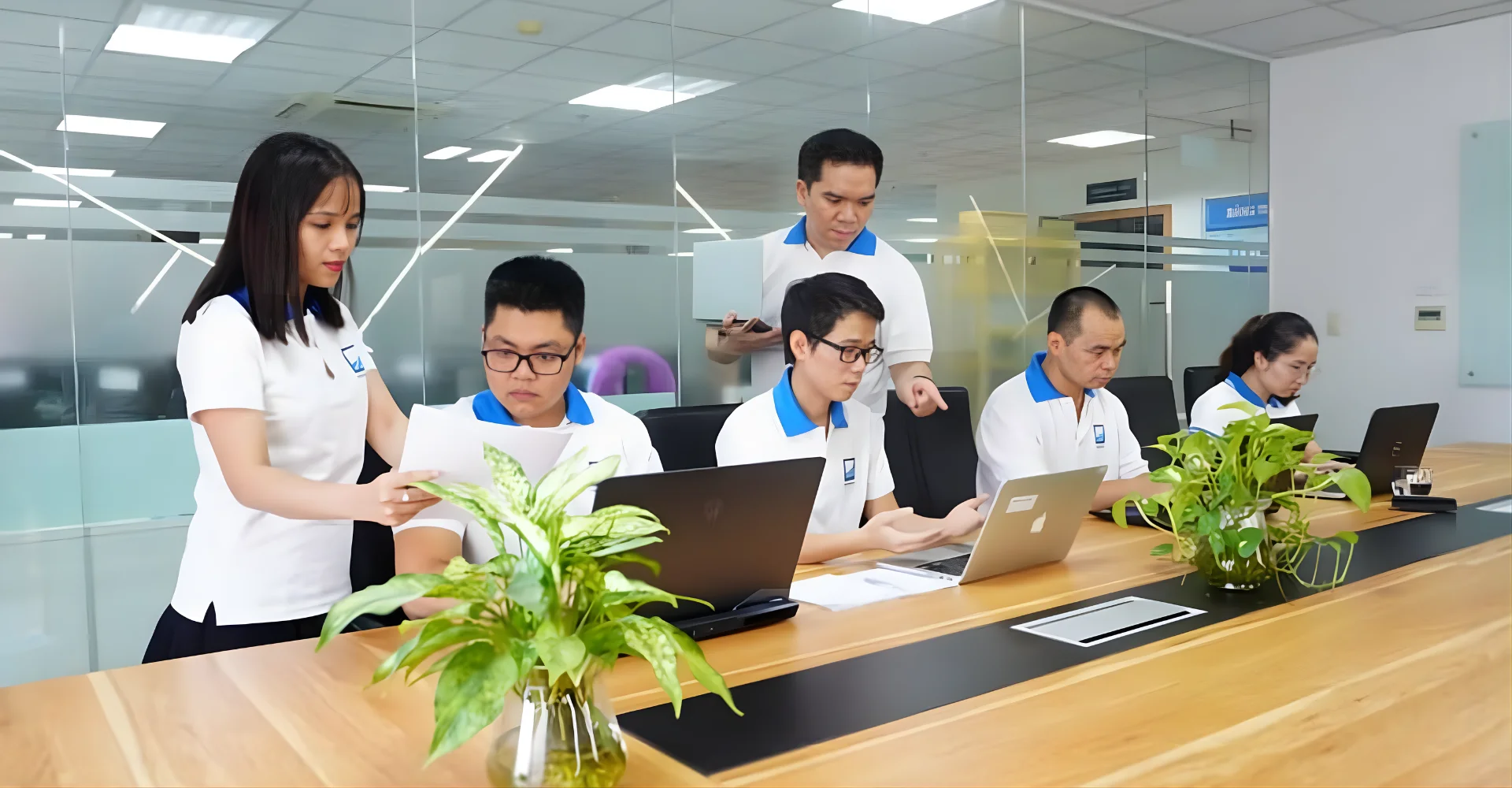Dedicated Development Team: Benefits, Costs And When To Hire One

Over the years, many startups have flourished after opting to hire a dedicated development team. The model is good for startups and software companies that don’t need to hire a team of IT experts, as building an in-house software team can be slow, costly, and distracting for your core operations. This team can work from anywhere, following the client’s instructions and collaborating closely with their internal processes and goals.
In this guide, we explain when to hire dedicated development team, how it compares to other models, and what to expect in costs and capabilities.
What is a Dedicated Development Team?
A dedicated development team is an outsourced group of software professionals—including developers, designers, and product managers—who work exclusively on your project as an extension of your in-house team. Unlike traditional outsourcing, this model ensures full focus, flexibility, and alignment with your product vision without the costs of permanent hiring.
For example, Slack built its early product with a dedicated development team from an external partner, which allowed the company to accelerate its MVP development and scale faster. This approach helped Slack quickly refine its platform based on user feedback and achieve rapid market growth before expanding its internal team.
Core Roles in a Dedicated Development Team
As a dedicated development team can contain different positions based on the requirements of each business, we will only present the core roles of a regular team:
- Project Manager: The Project Manager oversees the team’s workflow, aligns milestones with business goals, and resolves blockers that could derail progress. He or she serves as the main liaison between your organisation and the dedicated development team, ensuring smooth communication and delivery.
- Business Analyst: The Business Analyst translates business needs into actionable requirements and defines the project scope so that developers, designers, and QA know exactly what to build. They help align technical tasks with strategic objectives and clarify stakeholder expectations.
- Software Developers (Frontend/Backend/Full-Stack): Developers write, test, and maintain the codebase; they convert functional specifications into working features using your chosen tech stack. They also participate in code reviews, collaborate with designers and QA, and ensure performance and security standards are met.
- Quality Assurance (QA) Engineer: The QA Engineer designs and executes test strategies, ensures bugs are identified and fixed, and verifies that the software meets quality benchmarks and user requirements. They play a critical role in maintaining reliability, usability, and production-readiness of your product.
- UI/UX Designer: The UI/UX Designer creates user-centred designs, prototypes, and ensures the interface is intuitive, visually consistent, and aligned with your brand. They work closely with developers to turn user experience goals into real product features.
- DevOps / Infrastructure Engineer: The DevOps Engineer sets up build/deployment pipelines, cloud infrastructure, automates workflow, and monitors system health to ensure high availability, scalability, and maintainability. They enable smooth operations between development and production environments, reducing time-to-market and risk.

>>>Related post: What Is Offshore Software Development & Why It’s Important For Your Business?
5 Benefits of Hiring a Dedicated Development Team
Building a software product requires the right team. However, finding and managing in-house developers can be a challenge. Here’s where hiring a dedicated development team comes in. These teams offer a powerful solution, giving you access to skilled professionals without the hassle of building an internal team.
Here’s why hiring a dedicated development team is a smart move for your project:
- Access to Top Talent: Tap into a global pool of skilled professionals with a dedicated development team. You can find the perfect fit for your project by hiring dedicated software developers with the specific expertise you need.
- Faster Time-to-Market: A dedicated team works exclusively on your project, meaning quicker development and getting your software to market faster. No more waiting around for developers who are juggling multiple projects.
- Cost-Effective: Hiring a dedicated development team can be more cost-effective than building an in-house team from scratch. You only pay for the resources you need, and avoid overhead costs like employee benefits. Consider outsourcing dedicated software development teams for savings!
- Focus on Your Core Business: Free up your internal resources to focus on what you do best by hiring a development team. Let the experts handle the technical side of things, while you concentrate on sales, marketing, and running your business.
- Expertise When You Need It: Dedicated development teams typically consist of a diverse range of specialists, from project managers to software engineers and testers. Hiring a dedicated team ensures you have the right expertise at your fingertips for a successful project.

Dedicated Team vs. In-House Team vs. Project-Based Outsourcing
Choosing the right development team model can make or break your project—whether you build in-house, go with a dedicated development team, or opt for project-based outsourcing, each path offers distinct outcomes. In this comparison, we’ll map out all three models side by side so your business can pick the one that truly fits your goals.
| Feature | In-House Team | Dedicated Development Team | Project-Based Outsourcing |
| Hiring Time | Slow (recruit & onboard) | Fast (pre-assembled) | Varies by project scope |
| Flexibility | Limited | High – scales with needs | Low – tied to the scope of work |
| Product Focus | Medium (split priorities) | Full – 100% focused on one client | Task- or milestone-based |
| Communication | Daily internal | Integrated into client workflows | Often client-vendor handoffs |
| Cost | High (salaries, overhead) | Medium (variable cost structure) | Fixed or time-based fees |
| Best For | Long-term internal initiatives | Scaling products, evolving needs | Short, well-defined projects |
Cost of Hiring a Dedicated Development Team
Below are the typical costs that you should pay attention to when hiring a dedicated development team
- Hourly rates: Offshore regions start from US $25–50/hour, Eastern Europe roughly US $35–65/hour, and North America typically US $75–150/hour.
- Monthly team cost: A small dedicated team can cost US $10,000–25,000/month, while a large enterprise-grade team may reach US $80,000–150,000/month.
- Hidden overheads: Added infrastructure, tools, and onboarding can increase total cost by 30%–50% over base salaries.
- Regional rate drops: With AI productivity gains, some regions saw rates decline by 9%–16% in 2025.
How To Choose The Appropriate Dedicated Development Team
Let’s explore some key factors that can help you choose the appropriate dedicated development team to work with in the near future:
1. Technical Expertise and Skills
When hiring a dedicated software development team, checking and scrutinizing the technical expertise is important. You need to ensure that the team has a proven track record in the technologies required for your project. This includes relevant programming languages, frameworks, and tools. Checking if they have completed similar projects before is important. This will help determine if they are capable of handling the challenges of your project. Specializing in a specific field can help when hiring a software team. It shows they know the rules, standards, and what customers want.
Besides their current expertise, consider their commitment to adaptation to new technologies. The tech industry is constantly evolving, and your team should stay up-to-date with the latest trends and best practices by being proactive about keeping their skills sharp.
2. Communication and Cultural Fit
Effective communication is crucial for successful collaboration, especially when working with a software team in a different place or time zone. When outsourcing software development, assess the team’s communication, language skills, and willingness to work during your hours.
Cultural fit is a less tangible but equally important factor. The team’s work ethic, values, and operational style should sit well with your company’s culture for a working partnership. A shared understanding of goals, work pace, and decision-making processes always impacts the project’s progression.

3. Project Management and Methodologies
When hiring a dedicated development team, it is crucial to thoroughly evaluate their project management approach and the methodologies they use. Factors such as their ability to effectively communicate, prioritize tasks, and adapt to changes can greatly impact the project’s success.
When your business plans to hire a dedicated software development team, always ensure the dedicated software developers are good at project management. Hence, your project stays on track, meets deadlines, and stays within budget. Ask to review their processes for task assignment, progress tracking, and quality assurance to ensure the necessary structures are in place for successful delivery.
Consider also how flexible the team is in adapting to your project management tools and reporting frequency requirements. A dedicated development team should be able to integrate with your existing operations, providing transparency and accountability. The ability to accommodate your preferences for sprint lengths, scrum meetings, and retrospective discussions facilitates a collaborative atmosphere.
4. Support and Maintenance Post-Launch
The relationship with your dedicated development team should continue upon the initial deployment of your software; post-launch support and maintenance are equally vital. Inquire about the team’s availability for ongoing maintenance, their responsiveness to bug fixes, and their process for handling updates and feature requests.
A team of dedicated software developers will offer a solid plan for post-launch activities and show a commitment to ensuring the longevity and success of your software product. There is also the consideration of long-term collaboration potential. A dedicated development team that can offer multi-level user support and demonstrate a willingness to adapt to your evolving business needs can be a valuable asset.
>>>See more: Top 10 Offshore Software Development Companies
When to (or not to) Hire a Dedicated Development Team
✔️ When to Hire a Dedicated Development Team
- Long-term, evolving projects: When your product roadmap includes continuous updates, scalable features, and a desire for sustained development focus.
- Specialized domain expertise needed: When you require niche skills such as AI/ML, industry compliance, or complex integrations that your in-house team lacks.
- Limited internal bandwidth: When your in-house staff is fully committed to other business functions and cannot handle additional development demands.
- High flexibility and scalability required: When you want to quickly scale up or down your team based on project phases, without HR or overhead burdens.
❌ When Not to Hire a Dedicated Development Team
- Short-term or one-off projects: When the scope is fixed, well-defined, and will not expand beyond a single delivery phase.
- Strict fixed budget with no room for change: When the project must adhere to a tight, unchangeable cost structure and scope.
- Clear, definitive requirements and timeline: When you already know exactly what features you need, when they must be done, and no further iteration is expected.
- Minimal ongoing maintenance or expansion: When you simply need a task-based delivery and there is no long-term need for development continuity.
Hiring a Dedicated Development Team at Newwave Solutions
Finding the perfect team to build your software can be a struggle. At Newwave Solutions, we offer a simpler path to success with our dedicated development team services. Here’s why you should consider hiring a development team (or hiring software development specialists, as some might call it) through us:
Why choose our services?
Here’s how partnering with Newwave Solutions for dedicated software development teams can empower your business:
- Assemble Your Dream Team: Share your project goals with us, and we’ll create a dedicated team of skilled developers who are the perfect fit for your needs. This can include specialists like front-end and back-end developers, testers (QA stands for Quality Assurance), and project managers, all focused solely on your project.
- Focus on What Matters Most: Stop stressing about recruiting and managing a team. With a dedicated development team, you can concentrate on your core business activities while our experts handle the technical aspects of building your software.
- Cost-Effective Solutions: We offer competitive rates to fit your budget, whether you need a small team for a short project or a larger group for a long-term commitment. Our pricing is transparent, so you’ll always know exactly what you’re paying for – no hidden fees!
- Streamlined Communication & Management: Enjoy clear and consistent communication with a dedicated project manager who oversees your team and keeps you updated on progress. We use modern, flexible development methods to ensure your project stays on track and meets your expectations.
- Global Talent Pool: Tap into a network of highly skilled developers from around the world with a dedicated remote development team. This broader range of talent can potentially reduce your project costs.
Our Expertise and Technology Stack
Newwave Solutions takes pride in our team of highly skilled developers with in-depth knowledge across a wide range of technologies and programming languages. Here’s how our dedicated development teams can empower your project:
- Web Development: Leverage our expertise in building robust and scalable web applications using cutting-edge tools like React, Angular, Vue.js, Node.js, Python, and Ruby on Rails.
- Mobile Development: Our dedicated mobile developers can create native and cross-platform mobile apps for iOS and Android, utilizing frameworks like Swift, Kotlin, React Native, Flutter, and Xamarin.
- Cloud Computing: We leverage the power of cloud platforms like AWS, Microsoft Azure, and Google Cloud Platform to develop secure and scalable cloud-based solutions. Our dedicated development team services can help you seamlessly migrate to the cloud.
- Big Data and Analytics: Need to handle big data technologies? Our dedicated teams possess expertise in Hadoop, Spark, and NoSQL databases, allowing for efficient data processing, analysis, and valuable insights.
- Artificial Intelligence & Machine Learning: Looking to harness the power of AI and ML? Our developers can create intelligent and data-driven applications using frameworks like TensorFlow, PyTorch, and scikit-learn.
- Internet of Things (IoT): Our dedicated teams have the skills and experience to build connected IoT solutions. We integrate hardware and software components for enhanced automation and data collection, creating a seamless and efficient IoT ecosystem.

FAQs
1. What is the Cost of Hiring a Dedicated Development Team?
The cost of assembling your ideal dedicated development team depends on several factors. These include the team’s size, the skillsets required for your project, the project’s complexity, and the estimated development timeline. At Newwave Solutions, we offer clear pricing options that fit your budget and project needs. There are no hidden fees, so you’ll know exactly what you’re paying for our pricing model includes fixed price, T&M, and extended team.
2. How to Hire a Dedicated Software Development Team?
Hiring a dedicated software development service team at Newwave Solutions is a refreshingly simple and streamlined process. All you need to do is get in touch with us and share your project requirements and goals with our team. Once you’re happy with our comprehensive proposal, we’ll assemble your ideal dedicated development team and kick off your project according to a clearly defined timeline with established milestones.
3. How Do You Manage a Dedicated Development Team?
At Newwave Solutions, we firmly believe in fostering collaborative and transparent team management practices. Our dedicated project managers meticulously oversee your dedicated development team, ensuring seamless progress, unwavering adherence to quality standards, and strict alignment with established project milestones.
We leverage agile methodologies to promote flexibility, continuous improvement, and open communication throughout the entire development lifecycle. Regular progress reports, well-defined feedback loops, and performance evaluations ensure your project stays on track and consistently exceeds your expectations. This approach empowers you to stay informed and involved throughout the development process, fostering a successful collaboration with your dedicated development team.
Conclusion
Outsourcing dedicated development teams has emerged as a prevalent practice in the industry. This choice lets businesses access outside knowledge and resources by hiring a specialized team to tackle specific project difficulties. The advantages of flexibility, expansion, and cost-effectiveness associated with outsourcing contribute significantly to the popularity of this model.
Contact Newwave Solutions today if you are in need of a dedicated development team consisting of professional experts in IT & software building. We prioritize clear communication, transparent processes, and a commitment to delivering high-quality software solutions. This team of experts will bring your vision to life and propel your business forward.
Contact Information:
- Head Office (Hanoi): 1F, 4F, 10F, Mitec Building, Cau Giay Ward, Hanoi City, Vietnam
Branch Office (Tokyo): 1chōme118 Yushima, Bunkyo City, Tokyo 1130034, Japan - Hotline: +84 985310203
- Website: https://newwavesolution.com
- Email: [email protected]
To Quang Duy is the CEO of Newwave Solutions, a leading Vietnamese software company. He is recognized as a standout technology consultant. Connect with him on LinkedIn and Twitter.

Read More Guides
Get stories in your inbox twice a month.
Let’s Connect
Let us know what you need, and out professionals will collaborate with you to find a solution that enables growth.




Leave a Reply